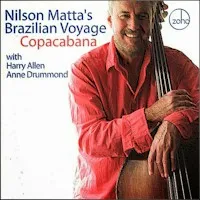Styles: Harp Jazz
Year: 2016
File: MP3@320K/s
Time: 26:40
Size: 62,0 MB
Art: Front
(4:42) 1. Soul Vibrations
(5:46) 2. Essence of Ruby
(2:04) 3. Ruby Echo
(3:15) 4. Afro Harping
(4:11) 5. Wax and Wane
(1:46) 6. Ebony Haze
(4:53) 7. Black Gold
Year: 2016
File: MP3@320K/s
Time: 26:40
Size: 62,0 MB
Art: Front
(4:42) 1. Soul Vibrations
(5:46) 2. Essence of Ruby
(2:04) 3. Ruby Echo
(3:15) 4. Afro Harping
(4:11) 5. Wax and Wane
(1:46) 6. Ebony Haze
(4:53) 7. Black Gold
Being a harpist on the jazz scene can’t be easy. And though jazz, as much as any genre, takes a sincere stab at incorporating non-traditional instruments into the body of work, it’s a not a huge stretch to assume that a harpist has gotta work a bit harder than most to find ways to fit in. Historically, there aren’t a lot of predecessors to glean wisdom from on a course to chart, and it’s not like the current scene is loaded with jazz harpists, so hoping for some gestalt action from fellow birds of a feather might be too much to expect. But it’s in the context of those potential obstacles that it’s so encouraging when someone like Brandee Younger steps up with such creative abandon to express a bold vision, and it’s why it’s really easy to forget that there may have been some obstacles less than ordinary in her path getting there. Younger’s debut EP Prelude immediately displayed equal willingness to groove, swing and sway. That was followed by the excellent live set Brandee Younger 4tet Live @ the Breeding Ground, an album that kicked up all kinds of sparks and heat. A great live set recording is the kind of thing where you immediately go and check the tour page on the artist’s site to see if she’s performing in a town near you. Younger’s Breeding Ground release elicits that kind of response. It has all the electricity you want to feel from music and it has all the intelligence you want to excite your cortex. And while much of the music sounds planted firmly in Today, Younger doesn’t turn her back on what came before. The composition “Soul Vibrations,” a frequent tune performed by jazz harp trailblazer Dorothy Ashby, is a fixture in Younger’s repertoire. Another trailblazer in jazz harp is Alice Coltrane… a different sound and a different approach than Ashby, yet Younger seamlessly insinuates her own sound onto the Coltrane composition “Blue Nile” and makes it part of the whole mix for some remarkable cohesion. A mix, worth noting, that incorporates an impressive number of Younger originals. Another Ashby tune Younger embraces is “Wax and Wane.” It’s also the title of her newest release.
Younger’s take on a contemporary soul-jazz sound is positively addictive. Where Live @ the Breeding Ground showed she has the ability to kick out flames and flash a sharp edge, Wax and Wane is proof that the music is still highly charged even when Younger chooses to lower the voltage and develop a flow that’s gift-wrapped for dance. The trio of bassist Dezron Douglas, guitarist Mark Whitfield and drummer Dana Hawkins dig deep for a groove that’s light on its feet with “Essence of Ruby.” And though it’s a tune just dripping with sunshine, the tenor sax of Chelsea Baratz reminds us that sometimes the heat of sunshine burns. But perhaps most impressive, and enjoyable, is how the seemingly different goals of the rhythm section, tenor sax, and the duo interaction of Younger’s harp and Anne Drummond‘s flute work in tandem in a fluid construct, as if Younger’s crew were taking individual streams of water and weaving them into a flowing river. But then there’s a track like the elegant “Ruby Echo,” and the abundance of warmth generated by the melodic bursts from harp and strings… an elegance that remains when the thick grooves return on “Afro Harping.” The cinematic “Ebony Haze” recalls Alice Coltrane’s spiritual heavy works on the Impulse label. Those early 1970’s recordings were melodically striking and maximized dramatic effect without risking its abiding sense of serenity. It’s nifty that Younger shows she’s already got a handle on that approach to her instrument and compositions, but it’s that she’s able to drop that track right after the groove-heavy “Wax and Wane” and park it up against the fender of subsequent track “Black Gold,” with its drifting ambiance and punctuated tempos, that’s an entirely different level of creative deftness. Younger is showing all kinds of promise with her recordings to date, and it’s a seriously positive sign about the strength of the modern jazz scene that albums like Wax and Wane are getting a share of the spotlight. https://www.birdistheworm.com/recommended-brandee-younger-wax-and-wane/
Personnel: Brandee Younger (harp), Anne Drummond (flute), Dezron Douglas (electric bass), Mark Whitfield (guitar), Dana Hawkins (drums), Chelsea Baratz (tenor sax) and Chargaux (violin, viola).
Wax & Wane









